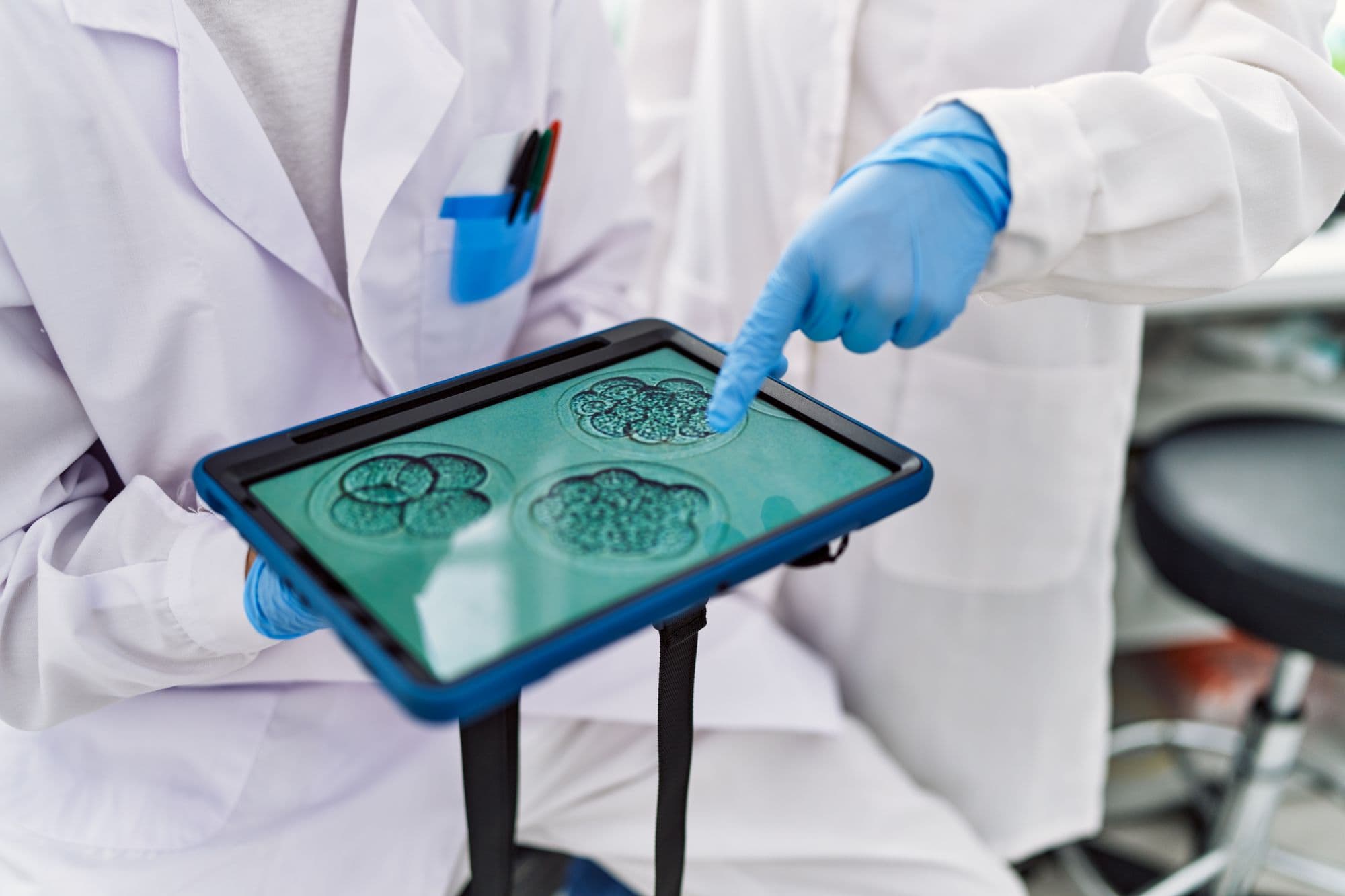PGT-A
(formerly PGS)
What It Screens For
Screens for missing or extra chromosomes (e.g., Down syndrome/Trisomy 21)
Who It's For
Women over 35, couples with a miscarriage history, and unexplained IVF failure
Advanced Embryo Screening for Healthier Pregnancies
Select the healthiest embryos. Reduce miscarriage risk. Improve your chances of IVF success. At Advanced Fertility Center of Texas (AFCT), we offer Preimplantation Genetic Testing (PGT) as part of our advanced IVF program. This cutting-edge technology allows us to analyze embryos before transfer to ensure they have the best chance of implantation and healthy development.
PGT can identify embryos chromosomal abnormalities (PGT-A), inherited single-gene disorders (PGT-M, also known as IVF preimplantation genetic diagnosis), and structural chromosome rearrangements (PGT-SR). By transferring embryos that are free of these abnormalities, patients can lower the risk of miscarriage, improve success rates, and move closer to their goal of a healthy baby and healthy pregnancy.
PGT is often recommended for women of advanced maternal age, couples with recurrent miscarriages or failed IVF cycles, and families with a history of genetic conditions such as cystic fibrosis or hereditary cancers.
ADVANCED GENETIC SCREENING
Preimplantation Genetic Testing (PGT) is an advanced laboratory technique performed during IVF. At the blastocyst stage (Day 5--6), a few cells are carefully removed from the embryo's outer layer (which becomes the placenta). These cells are analyzed to:
By selecting embryos with a normal chromosomal profile, we can improve pregnancy rates, reduce the risk of miscarriage, and support elective single embryo transfer (eSET) to minimize multiple births.

GENETIC TESTING OPTIONS
Understanding preimplantation genetic testing options for your IVF journey
(formerly PGS)
Screens for missing or extra chromosomes (e.g., Down syndrome/Trisomy 21)
Women over 35, couples with a miscarriage history, and unexplained IVF failure
(formerly PGD)
Detects known single-gene inherited conditions (e.g., cystic fibrosis, Tay-Sachs, BRCA mutations)
Couples with a family history of a genetic condition or known carrier status seeking IVF preimplantation genetic diagnosis to avoid transmission.
Screens embryos for structural rearrangements like translocations or inversions
Patients with known chromosome rearrangements
GENETIC TESTING
Preimplantation Genetic Testing helps identify the healthiest embryos for transfer

PGT is not required for everyone, but it can be very helpful for:
THE TESTING JOURNEY
A comprehensive step-by-step guide to genetic testing for your embryos
Eggs are retrieved and fertilized in the lab using either standard IVF or ICSI techniques to create embryos.
On Days 5-6, a few cells are safely removed from the embryo's trophectoderm (which becomes the placenta).
Biopsied cells are sent to a certified genetics lab for detailed chromosomal or genetic testing.
Embryos are cryopreserved using vitrification while we wait for the genetic test results.
After reviewing results with your physician, the healthiest embryo is selected for transfer in a frozen cycle.
AFCT Advantage
All embryo biopsies and culture are performed through Omni Med Laboratory, directed by Dr. Dmitri Dozortsev, one of the first embryologists to introduce ICSI technology to the United States.
Time-lapse imaging to monitor embryos in real time
Advanced biopsy techniques for safe, accurate testing
Partnerships with leading genetics labs for reliable results
Personalized embryo selection to maximize your chances of success
ANSWERS & CLARITY
No. PGT reduces the risk of transferring embryos with chromosomal or genetic abnormalities, but no test can guarantee a completely healthy baby.
No. Only cells from the outer layer (which become the placenta) are removed, leaving the part of the embryo that becomes the baby untouched.
Yes. Through PGT-A, we can identify embryo sex for family balancing or to avoid sex-linked genetic conditions.
Not always. Your fertility specialist will recommend it if it provides meaningful benefit for your situation.
Your doctor will discuss the results with you and explore next steps, such as another IVF cycle or other options.
Whether you're planning your first IVF cycle, have experienced miscarriages, or are interested in family balancing, PGT can give you clarity and confidence on your path to parenthood.
Serving Houston, The Woodlands, and College Station — with Telemed consultations nationwide.